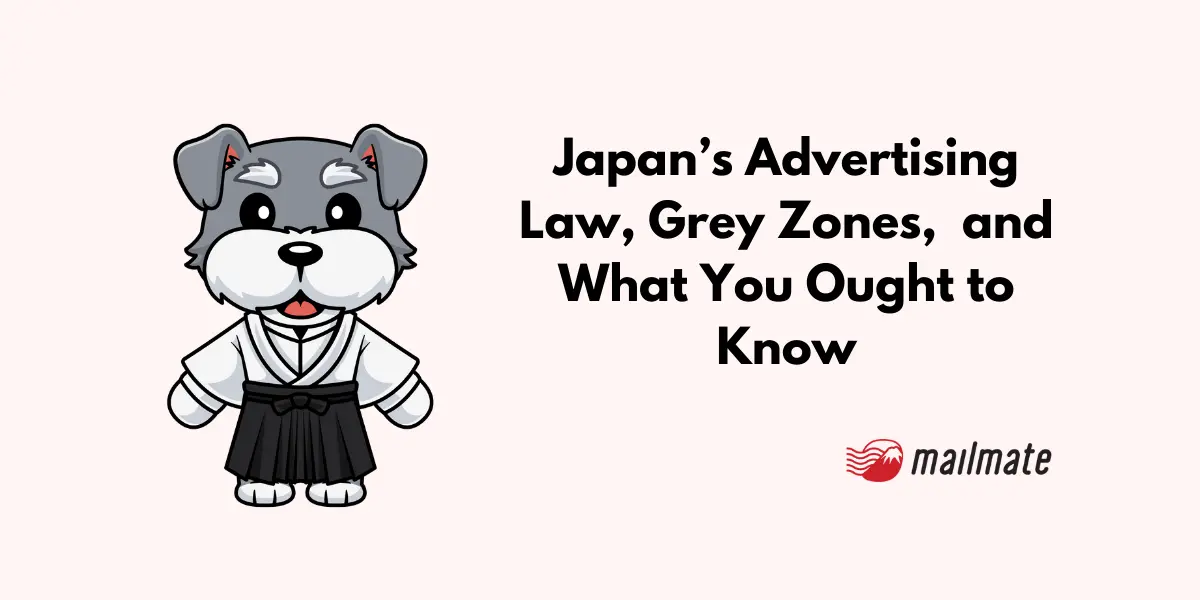Japan's Advertising Laws: What You Ought to Know

Understanding cultural differences in advertising is imperative in getting your marketing just right for the Japanese market.
But there's even more for business owners to think about: insufficient knowledge of Japan's advertising laws may result in unwanted legal attention.
From over-enthusiastic superlatives to unsubstantiated food claims, here are 6 points culled from relevant acts and regulations you'll want to know about as you create ads and sales copy for your business in Japan.
Point 1. Careful with superlatives.
The Act Against Unjustifiable Premiums and Misleading Representations (不当景品類及び不当表示防止法 Futou keihinrui oyobi futou hyouji boushihou) prohibits the use of misleading expressions and non-factual claims in adverts.
One of the stipulations in this law limits using superlative terms; such claims must be fact-based, not mere opinions ("Prohibition of Misleading Representations,” Article 5.i).
For instance, words like "No.1" and "the best" are not strictly illegal when digital marketing or in video advertising to Japanese consumers. Still, you must have empirical data or research to back up any comparative claim you make—should the Consumer Affairs Agency (CAA) come knocking.
CAA is Japan's regulatory body that prompts disciplinary action for deceptive and unfair business practices. When CAA determines that an advertisement or price label is misleading, they will order the business to cease the misleading practice and take necessary steps to prevent a reoccurrence.
As a disciplinary measure, CAA may publish a notice naming the company and their infraction. In some cases, they will order the payment of a fine. (For a further English explanation of CAA's role in regulating advertisements in Japan, see this article, available on Lexology.com by Atsumi & Sakai law firm.)
Point 2. Dual pricing is regulated.
The Unjustifiable Premiums act mentioned in Point 1 also regulates dual pricing ("Prohibition of Misleading Representations," Article 5.ii). Dual pricing is a common marketing tactic and not illegal in itself, but the following are three examples that fall under prohibited acts:
Presenting a higher-than-actual past price next to the current price for dramatic effect.
Inventing inaccurate retail or competitors' prices.
Posting false or misleading information of future price-hikes.
Having continuous or regular discount campaigns with too little cool-down time between sales periods may also be considered a violation.
Point 3. Stealth marketing is a no.
Stealth marketing, where the viewer is unaware they are being advertised to, is prohibited in Japan under the aforementioned Unjustifiable Premiums act ("Prohibition of Misleading Representations," Article 5.iii). The specific clause states:
"Any Representation by which any particular relating to transactions of goods or services is likely to be misunderstood by general consumers and which is designated by the Prime Minister as such, and considered likely to induce customers unjustly and to interfere with general consumers' voluntary and rational choice-making."
Therefore, while not explicitly spelled out in Article 5, law experts in Japan advise against "undercover marketing" and "native advertising" on social media platforms and elsewhere:
"Undercover marketing" refers to the paid placement of products (often in a movie or TV show), without the knowledge of the viewer that it’s a paid product placement.
"Native advertising" refers to disguising an ad as a general interest video or article. Articles or videos paying for placement must make this discernable to readers and viewers.
Targeting Japanese consumers by pretending to be a customer or a third party and writing positive reviews for your own services online would also constitute a violation of "general consumers' voluntary and rational choice-making."
Point 4. Ads for pharmaceuticals and medical devices are regulated.
The Act on Pharmaceuticals and Medical Devices (医薬品医療機器等法 iyakuhinn iryoukikitouhou) regulates the sale of this industry, including prohibiting the following:
False or exaggerated ads concerning the name and its effect or efficiency.
Misleading consumers into thinking a doctor guarantees the effect or efficiency.
Marketing that suggests abortion or uses obscene documents or images.
But even before you construct sales copy, business owners who wish to sell a pharmaceutical or medical device must be Marketing Authorization Holders or contract with a Marketing Authorization Holder.
(Marketing Authorization Holders must have an office in Japan and full-time employees who fill the roles of General Manager, Quality Manager, and a Safety Manager, among other stipulations.)
Go here for a full read of "Chapter IV Marketing and Manufacturing of Pharmaceuticals, Quasi-Pharmaceutical Products and Cosmetics," Act on Pharmaceuticals and Medical Devices.
Point 5. Ads for cosmetics are regulated.
Labeling for cosmetics is regulated under the Pharmaceutical Affairs Act (薬事法yakujihou) and must be in Japanese, with all ingredients clearly stated. There are specific words that are not allowed, and any false or misleading marketing text is prohibited.
JETRO's guidebook on importing cosmetics to Japan refers to the Act against Unjustifiable Premiums and Misleading Representations as being applicable to the marketing of cosmetics. Their guidebook states:
"The Act prohibits any form of improper labeling with exaggerated or false labeling that misleads consumers about the nature or quality of a product. The Consumer Affairs Agency can demand documentation of a rational basis for labeling that makes claims of superior quality etc. If the importer or reseller is unable to do so, those claims are considered to be a form of improper labeling."
If you are thinking of bringing your cosmetics to Japan, go through the correct procedures.
Point 6. Ads for certain food products are regulated.
The Health Promotion Act (健康増進法 kenkouzoushinhou) prohibits unsubstantiated claims of foodstuffs in the marketing of foods.
Specifically, if you claim that "X food product slows cholesterol absorption" or other specific health-related desired outcome, you would need to submit evidence that your food product claim is backed by verifiable evidence.
Food products that require approval to market in this specific way are called Foods for Specified Health Uses (FOSHU). A company must receive approval from CAA to market foods for specified health uses, where the representation describes a specific health-related claim.
Once the CAA has approved the food product, the company is permitted to make the health claim in their marketing.
Frequently asked questions
What are the common mediums for advertising in Japan?
Japanese advertising is commonly done through television, newspapers, magazines, and radio. These mediums have played a significant role in Japan's economic development over the second half of the century. However, social media marketing has quickly become a means for businesses to establish trust with Japanese customers.
What are the characteristics of Japanese ads?
Japanese ads often rely on a range of characteristics to create a cute and captivating image. These include shyness, vulnerability, and animal adorability.
Who are the largest advertising agencies in Japan?
The advertisement market in Japan is dominated by the two most prominent advertising agencies, Dentsu and Hakuhodo.
What are some popular advertising strategies in Japan?
Japanese brands are increasingly using influencer marketing to target Japanese internet users due to its authentic nature and ability to forge meaningful connections with the audience.
Where can I find examples of Japanese ads?
AdForum and Ads of the World are two digital platforms where you can find a collection of the best ads and campaigns from Japan. For Japanese Google ad campaigns (search advertising, etc.), check out bannnner.com.
What is the best platform for online advertising in Japan?
Yahoo! JAPAN is considered the best platform for display advertising in Japan. It has the no.1 reach for PC users (beating Google) and can reach 80% of mobile phone users.
What are some unique places for advertising in Japan?
Japanese advertisers can get exceptionally creative when it comes to where they can advertise in order to reach their target audience. Transit advertisements can be found inside commuter rail cars, buses, and in stations. Advertisements include hanging flyers, framed posters, stickers, and flat displays.
Final thoughts
Curious about how often companies are prosecuted for practices that lead to misrepresentation? Refer to this page (Japanese) on Consumer Affairs Agency’s official site.
We've covered the primary issues that business owners and anyone selling anything in Japan should know about. But there's always more to be learned and uncovered.
Navigating the advertising landscape in Japan requires understanding the country's unique laws and regulations. From using superlatives to marketing specific products such as pharmaceuticals, cosmetics, and certain food items—it's crucial to be aware of what is permissible for your marketing campaign and what could potentially lead to legal repercussions.
While this article provides a comprehensive overview of Japan's advertising laws, it's always advisable to seek professional legal advice when before targeting spinning up your digital advertising campaign.
Remember, a successful advertising campaign is not only about creativity and understanding Japanese users and consumer behavior, but also about respecting and adhering to the local laws and regulations.
As the world becomes more interconnected, understanding the nuances of advertising in different markets like Japan becomes increasingly important. So, whether you're a small business owner or a multinational corporation, a thorough understanding of Japan's advertising laws will be an invaluable asset in your marketing toolkit.
Spending too long figuring out your Japanese mail?
Virtual mail + translation services start at 3800 per month. 30-day money-back guarantee.

